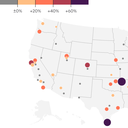America's new innovation hotspots, mapped

Northwest Arkansas, Louisville and New Orleans are emerging as America's new innovation hotspots, as measured by the change in the number of utility patents granted over time per 100,000 residents.
Why it matters: While Silicon Valley still holds the title for most patents awarded overall, the rate of change over time offers a compelling look at newly ascending areas.
- Utility patents may be granted for inventing or discovering a new and useful process, machine or composition of matter, among other things.
By the numbers: The Fayetteville metro area (which includes Bentonville) had 24.9 patents granted for every 100,000 residents in 2022, up from 10.2 in 2012 — a 144.1% increase, per U.S. Patent and Trademark Office data.
- Louisville had 27.3 patents compared to 13.3 (up 105.3%), while New Orleans had 11.4 compared to 5.6 (up 103.6%).
- Nationally, 42.5 patents were granted for every 100,000 residents in 2022, up from 38.4 in 2012 (+11%).
Zoom in: Northwest Arkansas' patent boom comes alongside broader growth for the region, which is home to Walmart headquarters, as Axios NW Arkansas' Worth Sparkman has reported.
- "Organically and by design, NWA is in the midst of reinventing itself, slowly shaking the hillbilly stereotype associated with the Ozarks," Worth wrote.
Yes, but: In terms of raw numbers, the San Jose and San Francisco metros blew the rest of the country out of the water, with 14,089 and 11,346 patents granted in 2022, respectively.
- New York took third place, at 6,979.
The big picture: "U.S. patenting and trademark activities are concentrated in certain areas of the country, with the highest rates on the East Coast and West Coast, around the Great Lakes, and in parts of the Southwest," per a February report from the National Science Foundation.
Caveat: Getting a patent is one thing; actually creating the proposed product or service is another.
- That said, the number of patents granted is still a useful proxy for measuring something as quantitatively slippery as "innovation."
What's next: Expect other potentially surprising innovation hubs to emerge over the next few years, as money from laws like the CHIPS Act and private investment funds new semiconductor plants and other high-tech projects nationwide.